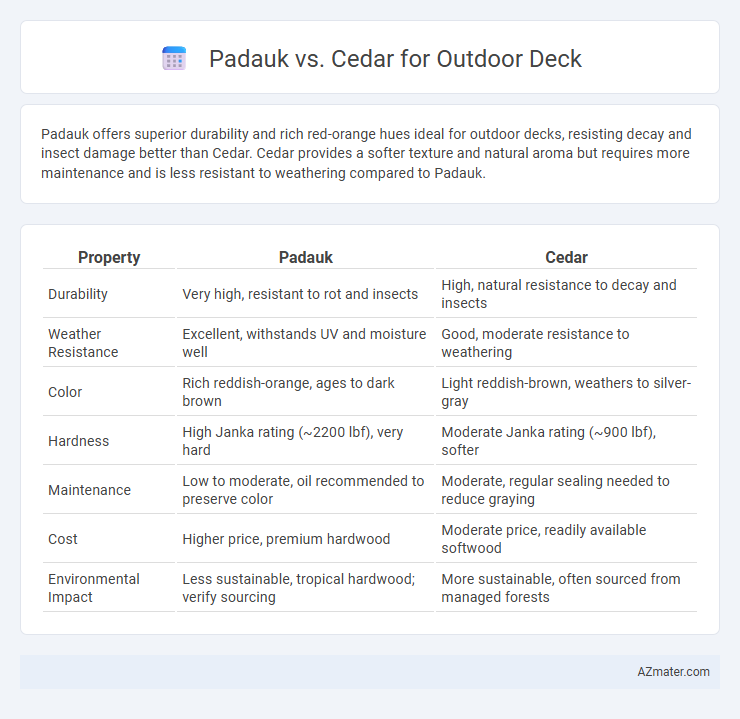Padauk offers superior durability and rich red-orange hues ideal for outdoor decks, resisting decay and insect damage better than Cedar. Cedar provides a softer texture and natural aroma but requires more maintenance and is less resistant to weathering compared to Padauk.
Table of Comparison
| Property | Padauk | Cedar |
|---|---|---|
| Durability | Very high, resistant to rot and insects | High, natural resistance to decay and insects |
| Weather Resistance | Excellent, withstands UV and moisture well | Good, moderate resistance to weathering |
| Color | Rich reddish-orange, ages to dark brown | Light reddish-brown, weathers to silver-gray |
| Hardness | High Janka rating (~2200 lbf), very hard | Moderate Janka rating (~900 lbf), softer |
| Maintenance | Low to moderate, oil recommended to preserve color | Moderate, regular sealing needed to reduce graying |
| Cost | Higher price, premium hardwood | Moderate price, readily available softwood |
| Environmental Impact | Less sustainable, tropical hardwood; verify sourcing | More sustainable, often sourced from managed forests |
Introduction to Padauk and Cedar for Outdoor Decks
Padauk and Cedar are popular hardwood choices for outdoor decks due to their durability and natural resistance to weather elements. Padauk is known for its vibrant reddish-orange hue and exceptional hardness, making it highly resistant to decay and insect damage. Cedar offers a classic, warm appearance with natural oils that protect against moisture and UV damage, ensuring longevity in outdoor environments.
Key Characteristics of Padauk Wood
Padauk wood, known for its vibrant reddish-orange color and exceptional durability, offers superior resistance to rot, decay, and insect attacks, making it an excellent choice for outdoor decks. Its dense grain and natural oils enhance weather resistance and reduce maintenance needs compared to cedar, which is softer and more prone to dents and scratches. The hardness of Padauk, measured around 1,720 on the Janka scale, provides a sturdy, long-lasting surface ideal for high-traffic outdoor areas.
Key Characteristics of Cedar Wood
Cedar wood is prized for its natural resistance to rot, decay, and insect damage, making it an excellent choice for outdoor decks. Its lightweight nature and straight grain allow for easy handling and a smooth finish, while the aromatic oils provide a natural deterrent to pests. Cedar's ability to resist moisture absorption helps maintain its structural integrity over time, ensuring long-lasting durability in various weather conditions.
Durability and Weather Resistance Comparison
Padauk offers exceptional durability with a Janka hardness rating of approximately 1,920, making it highly resistant to wear and impact on outdoor decks. Cedar, with a Janka rating around 350, is softer but contains natural oils that provide moderate resistance to rot and insect damage. Both woods withstand weather elements well; however, Padauk's dense grain offers superior resistance to moisture, decay, and UV damage compared to cedar's lighter, more porous structure.
Appearance: Color and Grain Patterns
Padauk features a vibrant reddish-orange hue that deepens to a rich reddish-brown over time, offering a striking and warm appearance for outdoor decks. Cedar displays a more subdued palette, ranging from light amber to pale reddish tones, with fine, straight grain patterns that convey a classic and rustic charm. The bold, dramatic grain of Padauk contrasts with cedar's subtle, uniform texture, making Padauk a choice for those seeking a vivid, eye-catching deck surface.
Maintenance and Longevity
Padauk wood offers high durability and natural resistance to decay and insect damage, making it ideal for outdoor decks with minimal maintenance requirements. Cedar, known for its natural oils, provides moderate resistance to rot and insect infestation but requires regular sealing or staining to maintain its longevity and aesthetic appeal. Over time, Padauk's dense grain reduces cracking and splintering, whereas Cedar may require more frequent upkeep to prevent weathering and maintain structural integrity.
Cost and Availability
Padauk offers a vibrant reddish hue and high durability but tends to be more expensive and less readily available than cedar due to its exotic nature and limited supply. Cedar is widely accessible in most regions, providing a more affordable option with natural resistance to decay and insects, making it popular for outdoor decking projects. Cost-effectiveness and availability often make cedar the preferred choice for budget-conscious homeowners seeking reliable performance.
Environmental Impact and Sustainability
Padauk wood is sourced from tropical regions with varying sustainability certifications, highlighting the importance of verifying FSC or PEFC labels to ensure responsible harvesting. Cedar, especially Western Red Cedar, often comes from sustainably managed North American forests with established replanting programs, making it a more environmentally reliable choice for long-term outdoor decking. Both woods offer natural resistance to decay, reducing the need for chemical treatments and contributing to lower environmental impact in deck construction.
Best Uses and Applications for Each Wood Type
Padauk wood offers exceptional durability and vibrant reddish-orange hues ideal for outdoor decks requiring weather resistance and striking aesthetics, making it perfect for high-traffic areas and decorative surfaces. Cedar excels in natural resistance to insects and decay with a lighter, warm tone suited for shaded decks, pergolas, and areas where a softer wood is preferred for ease of maintenance. Both woods provide excellent stability outdoors, but Padauk's hardness supports heavy furniture and impact, whereas Cedar's dimensional stability prevents warping in fluctuating climates.
Conclusion: Choosing Between Padauk and Cedar for Your Outdoor Deck
Padauk offers exceptional durability and vibrant color retention, making it ideal for long-lasting outdoor decks with striking aesthetics. Cedar provides natural resistance to decay and insects with a softer texture, offering a more budget-friendly and classic wood option. Selecting between Padauk and Cedar ultimately depends on your priorities for color vibrancy, maintenance, and initial investment.

Infographic: Padauk vs Cedar for Outdoor Deck
 azmater.com
azmater.com